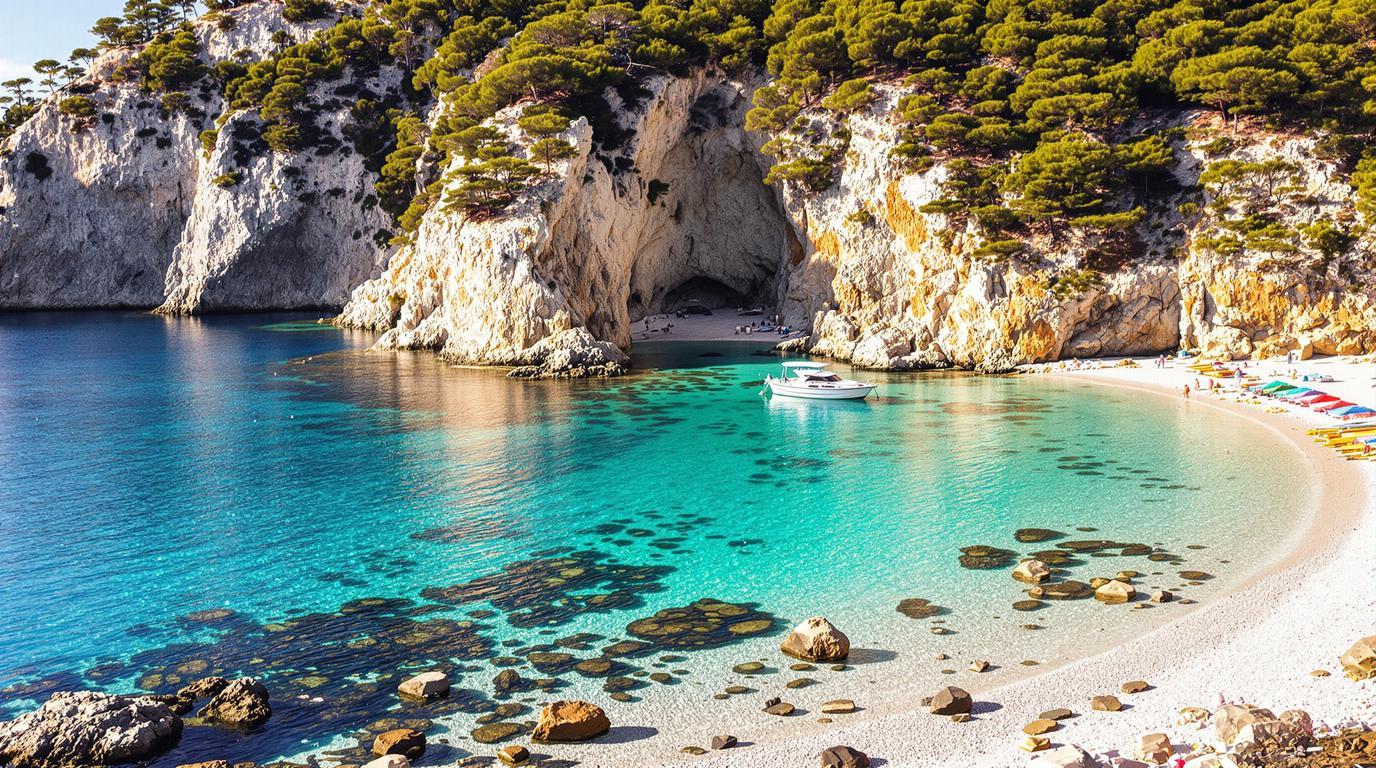I accidentally missed the sunrise ferry from Piraeus. Instead of reaching the tiny Greek island of Agistri with the morning crowd, I found myself alone on a midday boat, watching Athens fade into a hazy silhouette. The mishap proved fortuitous – what awaited was a slice of Mediterranean paradise where time moves at the pace of olive trees growing and locals still leave their doors unlocked at night.
Where pine forests meet turquoise waters just one hour from Athens
Agistri sits just 23 kilometers southwest of Athens in the Saronic Gulf, yet remains remarkably untouched by mass tourism. Despite its proximity to Greece’s bustling capital, many travelers overlook this verdant 14-square-kilometer island in favor of more famous destinations.
“We like to think of ourselves as Athens’ best-kept secret,” explains Dimitri, who’s operated the small family-owned taverna near Megalochori port for three decades. “The Athenians come for weekends, but international visitors? They are still discovering us.”
Unlike its glamorous neighbors Hydra and Spetses, Agistri offers something increasingly rare in Greece: authenticity without pretension and natural beauty without crowds – especially if you visit during shoulder season.
Hidden corners where locals still outnumber visitors
The secret swimming spot at Chalikiada Beach
A 20-minute hike through fragrant pine forest led me to what might be the perfect Mediterranean swimming spot. Chalikiada Beach features no facilities, no rental chairs, and most importantly – no crowds. The beach’s white pebbles give way to water so clear that I could count tiny fish darting between my feet from waist-deep water.
Local tip: Pack water and snacks, as there’s nothing but nature here. The rocky entry point requires water shoes, but the reward is worth it – especially when you have this crystalline cove entirely to yourself.
The ancient chapel trail near Metochi
From the sleepy village of Metochi, I followed a barely marked trail that connects three Byzantine-era stone chapels. Each tiny structure, some barely larger than a garden shed, contains centuries-old religious artwork that has survived pirates, occupations, and time itself. The path winds through olive groves where elderly locals still harvest the way their grandparents taught them.
The third chapel, Agios Nikolaos, perches dramatically on a cliff edge with panoramic views across to neighboring islands dotted with ancient churches. I sat alone on its stone steps, watching fishing boats create white trails across the blue canvas below.
A taste of the sea caught hours before serving
In the fishing hamlet of Skala, I discovered Tassos Fish Taverna, where no printed menu exists. Instead, Tassos himself – a leathery-skinned fisherman in his seventies – guided me to a small display case containing the day’s catch, pulled from local waters before dawn.
I pointed to a silver-scaled fish I didn’t recognize. An hour later, it arrived perfectly grilled, dressed only with olive oil pressed from trees visible from my table, lemon, and wild oregano picked from the hillside. The simplicity was the point – on Agistri, the ingredients speak for themselves.
Essential insights for the savvy island explorer
Getting there and around
Ferries depart from Piraeus port multiple times daily, with the journey taking 55-75 minutes depending on whether you choose the faster Flying Dolphin or traditional ferry. The island has no airport. Book return tickets in advance during July and August, when weekend Athenians can fill boats to capacity.
While public buses connect the main villages, renting a bicycle (€10/day) provides the freedom to explore at your own pace. The island’s main road is just 9km long, making cycling manageable even for casual riders.
Where to stay beyond the obvious
Skip the larger hotels in Skala in favor of family-run guesthouses in Megalochori or Limenaria. For something truly special, the stone-built Aponisos Villas on the island’s remote western peninsula offer seclusion just steps from a private swimming cove – ideal for those seeking to experience the tranquility of car-free Greek island life without the premium prices of more famous islands.
Finding your own rhythm on Greece’s accessible escape
As afternoon faded into evening on my final day, I joined locals at a small kafenio in Megalochori square. An elderly gentleman played bouzouki while children chased each other around ancient olive trees. No one checked their phones. No one rushed.
Agistri offers something increasingly precious: a genuine Greek island experience where connection happens naturally. Unlike destinations where you must venture far from civilization to escape crowds, here authentic moments find you – often just a short ferry ride from the ancient wonders of Athens yet worlds away in spirit.
